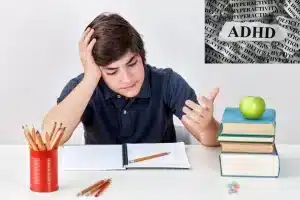If you have found yourself here, you probably have a child with ADHD, or one that you think has ADHD. I’m here too. Parenting a child with ADHD can be challenging for sure. ADHD is one of the most common neurodevelopmental disorders in childhood. Because of this, people, myself included, make a lot of assumptions about ADHD. One of those assumptions was that ADHD just means a hyperactive or inattentive child. I never thought parenting a child with ADHD could be so hard, exhausting, and all-consuming. I thought it mostly affected their education, or that it meant those kids had extra energy.
As a teacher, I have seen ADHD in kids firsthand, but it wasn’t until my son started struggling in kindergarten (and some in preschool) that I really understood the full effect that ADHD can have. My son is very smart, and ADHD has not yet affected his academics, but it impacts just about everything else. He is impulsive, he has very high energy, he cannot focus on one thing for very long, and he talks all the time, and I mean all the time. It can be exhausting to be his mom. But, because he has ADHD, he is also very creative, he is good at problem-solving, he is excellent at baseball and anything physical, and he is willing to try just about anything.
I hope as you navigate parenting a child with ADHD, some of what I learned along the way can help you understand your child better and feel more confident parenting them. Here are 10 things I learned the hard way so, hopefully, you don’t have to!
1) ADHD is a neurodevelopmental disorder
Table of Contents
What does this mean? Very simply, a person with ADHD has a brain that is wired differently and structurally different from a person without ADHD. People with ADHD, have a deficiency in a neurotransmitter called norepinephrine. This deficiency causes a person’s neurotransmitters to be less efficient and functional in 4 parts of the brain: the frontal cortex, which is responsible for our attention, organization, and our executive functioning. The limbic system, which regulates our emotions. The basal ganglia, which is responsible for communication within the brain. And lastly, the reticular activating system, which is a relay system for information to enter and leave the brain. A deficiency of neurotransmitters in the reticular activating system can cause impulsivity, hyperactivity, and inattention. So, because your child with ADHD has all or some of those symptoms or deficiencies, it is not because it is a choice, but because their brain doesn’t work the same way as other people’s. I know this helped me realize that my son not paying attention, or continually touching things he wasn’t supposed to, was not always something he can stop. His brain says do it and he does it. The part of his brain that says wait, think about it, doesn’t work. Your child’s ADHD behavior is not because of your parenting. It is literally their brain working in a different way.
2) ADHD has an emotional regulation piece
My son has always had issues with his anger. He lashes out quickly, and he gets extremely upset when he doesn’t get his way, he is very black and white and does not like when other people do not follow the rules. He is a very kind-hearted child, so seeing these behaviors was very upsetting. In preschool, he was a biter. He sometimes would be placed in other classes other than his own because he couldn’t deal in his own class. At the start of kindergarten, he would get in other children’s faces and yell, sometimes pushing them when they upset him. I had no idea that this was emotional dysregulation from ADHD. The part of his brain that would say, “Hey I feel mad, but I shouldn’t yell at my friends, (the cerebral cortex)” has a weak connection to the emotional control center of his brain (the amygdala). Because of this, kids with ADHD struggle to stop and take a breath, they can tend to go straight to “I’m mad, I need to yell.” So, when your child has a huge outburst over what you may call nothing, it is because their brain is not and cannot tell them not to, like it does the rest of us. We all feel the same emotions, but our brain helps us regulate our reactions. If you get mad driving and want to get out of your car and punch the other driver (we’ve all been there, right!?), your cerebral cortex is what tells you not to. It doesn’t change your feeling, it changes your reaction. People with ADHD have the same feelings, but they can’t regulate their reactions. It is important to remember that this is a huge part of ADHD even though it is not listed as an official symptom in the DSM-5.
3) ADHD has 3 types

4) It’s not because they don’t want to
I still struggle with remembering that my son is not ignoring what I tell him to do. He doesn’t not-listen because he doesn’t want to, his brain just can’t. Now, this is NOT an excuse for him to get away with whatever he wants. It means I have to change how I’m giving directions. When I tell him not to jump on the couch, and he’s doing it 3 seconds later, it’s not because he is blatantly ignoring me, it’s because people with ADHD have very little short-term/working memory so those directions are literally not in his brain anymore. Or when I tell him to clean his room – that is too big of a task for his brain to grasp. So what do I do? I replace jumping with something else – “Don’t jump on the couch- squeeze the ball instead.” I give one-step clear directions ‘Clean your room. First, put all the clothes in the hamper.” There are a lot of ideas people have had success with, but you need to find what works for you!
5) When Parenting a Child with ADHD Rewards or consequences need to be immediate
Remember how I said that people with ADHD have impaired short-term memory? This plays a role in behavior management as well. When you say “You can have TV when you finish cleaning your room” that is too long of a time for them to remember what they are doing and why. Or, “If you get in trouble at school you don’t get TV later,” again an entire school day is too long to remember a potential consequence. Instead, rewards need to be immediate – you can use candy, check marks, or stickers, but use something they want that is small and quick. “Put your clothes in the hamper and you get a sticker.” “When you throw your toy, you have a time-out.” There are many strategies for effective time outs. In the end use what works for you, but make it quick and right away, that way they don’t need to remember what they’re working for all day.
6) ADHD is not bad!
There are benefits to having a brain with ADHD. People with ADHD think differently, so often they are good problem solvers. They tend to accomplish a lot because they have a lot of energy. People with ADHD can also hyperfocus, meaning they can focus on the task at hand if they are interested in it, and get it done well. Outgoing people with ADHD are usually excellent conversationalists. In addition, people with ADHD can be creative, resilient, and spontaneous because of their neurodiversity, not in spite of it. So, when you look at your hyperactive, inattentive, all-over-the-place, child, also look for these positive traits because they’re there. I promise.
7) A diagnosis is not bad
You may think that a diagnosis doesn’t matter unless you want your kiddo on medication, but it can still make a difference! A diagnosis means your child can qualify for a 504 plan. A 504 plan is a way to give students with a medical diagnosis (and yes, ADHD is a medical diagnosis that only a doctor can diagnose) support in school. For example, a student with asthma may have a 504 to have access to their inhaler during the school day. A student with ADHD can have a 504 that says they get preferential seating, can take frequent breaks, or is given tests 1:1. There is a whole list of things to help your child that can be put on a 504. A 504 plan says that a school is required to give your child those supports. Because of this, a diagnosis is a good thing! It means you can get your student what they need to be successful.
8) ADHD does not affect intelligence
There is no direct correlation between ADHD and intelligence. It may be harder for people with ADHD to complete work or find the motivation to learn, but it does not mean they are not smart. People with higher intelligence and ADHD struggle with the symptoms just as much as those with lower intelligence. Being smarter does not mean you do not need treatment and support, and having a lower intelligence doesn’t necessarily mean you need more ADHD support. It’s all about finding what works for your child where they are. Remember, just because your child has ADHD, it doesn’t mean that they aren’t smart, just that their brain works differently.
9) Find and use your resources
If your child is in school you will have all the resources of your school once you have a diagnosis. Your school will have a counselor, a teacher, maybe a behavior specialist, and possibly more. Outside of school, you have your pediatrician who can give you suggestions and direct you to other resources. You may have a child therapist in your area. Children with ADHD can benefit from play therapy. Play therapy helps children process their emotions and teaches them strategies to improve impulsivity and executive functioning. If you cannot find somewhere that does play therapy near you, you can find many articles on how to incorporate it into your home! Or should you live near a children’s hospital, they may have an ADHD specialist who can provide support as well. What if your child is 3 or under? Your local school system will have an early intervention program you can contact. And, don’t forget other parents! Parenting a child with ADHD is not always easy. Parents who have been through parenting a child with ADHD and who are still parenting children with ADHD may be your best resource! Find Facebook groups, a local moms group, or even a parent support group. Experience is the best teacher so talk to those who have some!
10) It is okay to try medication
In the world of ADHD, it seems like medicating your child is a taboo topic. Some think there’s an age that makes it ‘okay,’ or maybe their acceptance of medication depends on the ‘severity’ of the child’s ADHD. Whatever the reason, it is a hot topic. If you have talked to your pediatrician and feel that trying medication for your kiddo is a good decision then good for you! Good for you! However, if you talked to your pediatrician and don’t feel that medication is a good decision for your child, good for you! Don’t do it. Whatever you, as the parent, feel will help your child the most, do that. I am not an expert on medications, but I know that they help the kids who need them. If your child is doing great in school but is impulsive, medication can still help. Behavior and socialization are valid reasons to investigate using medication. It is not only to help with academics. If you are concerned about addiction, share that concern with your doctor, there is a lot of research on that! If you want to try behavioral modification first, then medication, then go that route, that’s what I’m trying with my son. I am currently in the process of getting my son a 504 and working with his therapist and school team. If those supports don’t work, I’m willing to revisit the pediatrician and try medication. It worries me some, but only because of the taboo, I don’t know any actual concerns about it. If it doesn’t work or makes my kid a ‘zombie’ then we will try something else. I’d rather try whatever I can, and help him with his social interactions and behaviors he struggles with than let him flounder if the behavior modifications don’t work. Again, this is up to you. Whatever anyone says, you are the parent and you are the expert on your child. Do what works for you and them.
Conclusion
Parenting a child with ADHD is hard. It is a lot of work. It is exhausting. There are days I want to pull my hair out. Days that he pushed a kid at school, argued with his teachers, argued with me, talked my ear off all day, and did none of the things I asked him to. Those are hard days. But it can also be rewarding. Seeing my son make good choices and be so proud of himself, is a good feeling. Watching him be creative, solve problems, and look at the world differently is fun and just as rewarding. Take care of yourself. Grant yourself space and time to feel frustrated, to sit in the quiet (I’ll tell my son I need 10 minutes of quiet space and I set a timer), forgive yourself and your child, and always have something you can do for yourself. Keep loving your child the best way you can and support them with whatever resources you have access to. You are doing your best and I hope that this list helps you realize things I learned the hard way.
ADHD FAQs:
What is ADHD?
ADHD stands for Attention Deficit Hyperactivity Disorder and it is a neurodevelopmental disorder. It is not a learning disability.
What causes ADHD?
The source of ADHD is still being researched. At the moment it is thought that, ADHD can be passed down genetically and that external factors such as smoking/drugs/drinking in pregnancy, low birth weight, brain injury, and premature birth may also lead to ADHD.
What are some of the symptoms of ADHD?
The symptoms of ADHD vary from child to child and can be dependent on the type of ADHD they have. Some common symptoms are:
1) inability to focus
2) struggle to regulate emotions
3) cannot sit/stand still but fidget
4) forget a lot
5) lose things often
6) talk too much
7) struggle to make friends
Can adults have ADHD?
Yes! It looks a little different, but you can easily look up signs of adult ADHD.
How do you get diagnosed with ADHD?
There is no test for ADHD, but your pediatrician can diagnose through a checklist rating symptoms, such as the Vanderbilt scale.
Helpful ADD/ADHD Resources:
Sources
Benson, Scott. (n.d.). Attention-deficit/hyperactivity disorder (ADHD). Psychiatry.org – Attention-Deficit/Hyperactivity Disorder (ADHD).
Centers for Disease Control and Prevention. (2022, August 9). What is ADHD? Centers for Disease Control and Prevention.
Kofler MJ, Singh LJ, Soto EF, Chan ESM, Miller CE, Harmon SL, Spiegel JA. Working memory and short-term memory deficits in ADHD: A bifactor modeling approach. Neuropsychology. 2020 Sep;34(6):686-698. doi: 10.1037/neu0000641.
Nigg, Joel & Editors, A. D. D. (2023, January 22). How ADHD amplifies emotions. ADDitude.
Sherrell, Z. (2021, July 20). What are the benefits of ADHD? Medical News Today.
Silver, Larry(2022, July 13). ADHD Neuroscience 101. ADDitude.












Add Comment